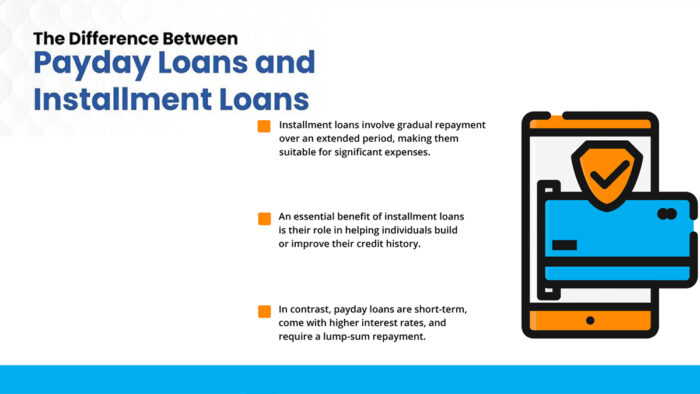Undoubtedly, installment and payday loans offer quick funds when it comes to rendering financial assistance. However, both loan types have major differences, such as their qualification requirements, fees, and repayment. Knowing and understanding these differences will be helpful when searching for a better loan option for you. Payday loans vs. installment loans: what’s the difference? Keep reading to find out.

What Are Payday Loans?
Payday loans are short-term, high-cost loans designed to offer financial assistance and be paid back with your next paycheck. They come with a high loan principal and high fees, which are usually based on a portion of the borrower’s income. Following this, payday loans offer fees that may be equal to APRs as high as 400% and loan amounts of up to $500. Additionally, payday loans can be accessed online or from storefront vendors.
Requirements to Apply
The requirements required to apply for or secure a loan differ depending on the type of loan. As for payday loans, the application process and requirements are less than those for installment loans. So, to apply, here are the things you need:
- Proof of income.
- You need to be at least 18 years old.
- Contact information.
- Proof of residency.
- Valid means of identification.
However, all of these vary depending on the lender, but these are the basic requirements to secure this type of loan.
Pros and Cons of Payday Loans
Everything that has a good side also has a bad one as well. In other words, there are benefits and risks involved with applying for a payday loan. Here are the pros and cons of applying for or taking out a payday loan:
Pros
- Rollover options
- No collateral is required.
- Quick access to funds.
- Options for bad-credit borrowers.
- Unsecured loan.
- Minimal requirements.
- Convenient
- Small loan amounts.
- Short-term in nature.
- High costs.
Cons
- Possible repeated borrowing.
- Rollover fees.
- Debt trap risk.
- Short repayment periods.
- Negative impact on credit score.
- Predatory lending.
- High fees and interest rates.
This is evidence that even though payday loans offer financial assistance, they are also a risky option for borrowers.
What Are Installment Loans?
Installment loans are a type of personal loan, and they are usually repaid on a particular or fixed schedule with fixed interest rates as well. What’s more, the loan term you choose during the application procedure will determine how long you will be paying back the loan. Additionally, installment loans offer amounts ranging from $1,000 to $100,000, but it depends on your income and credit history.
Requirements to Apply
To repeat, the requirements for installment loans are higher than those for payday loans, and they also vary among lenders. In the meantime, here are the requirements to keep in mind when considering an installment loan:
- Credit history
- Pay stub
- Valid form of identification
- Loan use
- Address
- Proof of income
- Social security number
- A credit score of 670
These are the necessary information and documentation that you need to prepare if you want to apply for an installment loan from any lender.
Pros and Cons of Installment Loans
Here are the advantages and disadvantages of applying for or taking out an installment loan:
Pros
- Improve your credit score.
- Predictable repayment terms.
- Accessibility
- Lower interest rates.
- Larger loan amounts.
- Flexible repayments.
- Longer repayment terms.
Cons
- Overborrowing possibility.
- Variable interest rates.
- Interest and fees.
- Collateral risk.
- Possible penalties.
- Long-term repayment.
- Credit check.
This is proof that even though installment loans are a good option for borrowers, they are also a risky option.
Payday Loans vs. Installment Loans: What’s the Difference?
Here is a table illustrating the full differences between payday loans and installment loans:
| Feature | Payday Loans | Installment Loans |
| Loan Amount | Usually, $500 or less | Up to $100,000 |
| Collateral | Not required | Some lenders do require collateral, while others don’t |
| Financial Impact | If not properly managed, it can result in debt cycles | Flexible and predictable repayment |
| Access Level | Easy to access, requires minimal information and documentation | Might need a credit check and complication requirements |
| Interest Rates | High APRs | Lower APRs |
| Loan Term | Short-term, usually 2 to 4 weeks | Longer term, a few months to years |
| Repayment | Single lump sum | Fixed installments |
| Cost of Borrowing | Higher | More affordable |
| Purpose of Borrowing | Emergency use | Larger expenses |
The key differences between payday loans and installment loans are the interest rates, repayment terms, repayment structure, and loan amount. Nevertheless, whether or not you need an installment loan or a payday loan depends on your financial needs and situation.
Alternatives to Payday and Installment Loans
If you are looking to take out a loan, here are some alternatives that you can consider if you do not want a payday or installment loan:
- Friends and family.
- Payday alternative loans.
- Cash advance apps.
- Credit cards.
All of these are effective alternatives that you can turn to if you do not want to go for or do not qualify for an installment loan or payday loan.



